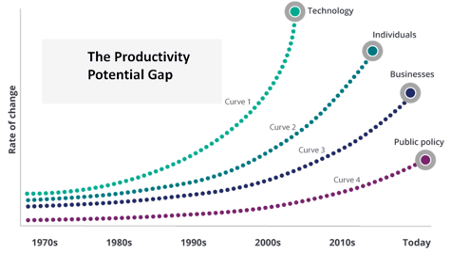
How big is the digital skills crisis?
The McKinsey Global Institute (MGI) estimates that an additional USD $13 trillion could be added to global GDP from 2018-2030 through digitisation, automation, and AI resulting from the creation of new business opportunities and the reinvestment of productivity gains into economies.
Yet the majority of the promised gains since the advent of the digital economy have yet to be realised. In fact, for the decade to 2017, the US, still the global leader of the digital economy, witnessed its most sluggish productivity growth since the 1970s.
Research has demonstrated that a key explanation behind this ‘productivity puzzle’ is a digital skills crisis that is preventing individuals, organisations and entire economies from maximising the output of new technologies. Research by Accenture has found that:
- USD $11.5 Trillion of GDP growth forecast to be lost over the next 10 years if G20 countries cannot meet new skill needs;
- In excess of 1% of global GDP growth to be lost every year due to skill shortages.
These findings strongly align with further global research. The UK government has identified that digital skills are ‘essential requirements’ for 82% of all UK job vacancies, and that ‘digital transformation can make every business in every sector more productive’. Yet the Open University’s 2019 Bridging the Digital Divide report found that 88% of UK organisations stated a shortage of digital skills currently has a ‘significant negative impact on productivity, efficiency and competitiveness’.
Comparable challenges are being reported by european and global counterparts:
- European Commission figures show that around 37% of workers in Europe don’t have even basic digital skills;
- The world economic forum estimates that more than half (54%) of all employees will require significant reskilling by 2022.
What is driving this crisis?
“Education has won the race with technology throughout history, but there is no guarantee it will do so in the future” (Schleicher, Director, OECD Directorate for Education and Skills, 2019).
The acute skills shortage being faced across the globe is being driven by the confluence of two key factors:
- Technology is now accelerating at an ever faster rate;
- Technology (and digital skills more broadly) are now critical to an ever higher proportion of job roles.
Thus although education has always has always faced the challenge of keeping pace with technology, the issue is more acute than ever, impacting an ever growing proportion of the workforce. This gap between the productivity potential promised by new technologies and the productivity that can be realised by the skills of the workforce is known as the productivity potential gap:
As the graphic depicts, technological change is accelerating at an ever faster rate, with individuals struggling to keep pace, and businesses and public bodies lagging farther behind.
Developing the new foundational skills of the digital economy
Closing this gap will be critical to realising productivity gains promised by digital technologies, must be critical focus of our education systems, requiring innovations in both how and what we teach.
Job market data firm, Burning Glass, completed an analysis of 56 million resumes and more than 150 million unique job postings, which identified 14 critical ‘New Foundational Skills’ for the digital economy:
- Demand for the 14 skills grew at an average of 32% over 5 years to 2018;
- Digital Building Blocks are becoming critical to all organisations and industries beyond traditional tech fields;
- Business Enabler skills are required to realise value in markets when customer-centricity is a key indicator of business success.
- ‘Human Skills’ are increasing in importance as we move from a knowledge economy to an innovation economy;
- Demand for the skills is not confined to the IT or ‘digital’ sectors with growth across all industries.
“Digital skills drive career advancement, increase pay and better prepare workers for a changing labour market.” UK government, Dept. Digital, Media, Culture and Sport.
If these skills can be developed successfully then the benefits for learners are dramatic: UK data shows that digital skills carry a wage differential of 29% over non-digital roles and specific digital skills reduce workers risk of automation by 59%.
Alongside the rise of alternative educational pathways, such as bootcamps and online learning platforms, universities and further education institutions will be critical to solving this challenge. All must work in close collaboration with industry and provide a breadth of educational innovations across traditional degrees, post-graduate programs, apprenticeships and lifelong learning opportunities.
Bibliography:
Accenture, It’s learning. Just not as we know it.
https://www.accenture.com/gb-en/insights/future-workforce/transforming-learning
McKinsey Global Institute, Twenty-five years of digitization.
U.S. Bureau of Labour Statistics, Labor Productivity and Costs
https://www.bls.gov/lpc/prodybar.htm
Andreas Schleicher, Director, OECD Directorate for Education and Skills, What the fourth industrial revolution could mean for education and jobs
Open University’s 2019 Bridging the Digital Divide
http://www.open.ac.uk/business/bridging-the-digital-divide
Miguel Milano, President, Salesforce, The digital skills gap is widening fast. Here’s how to bridge it
UK Gov. Dept. of Digital, Media, Culture and Sport, No Longer Optional: Employer Demand for Digital Skills
Burning Glass, New Foundational Skills of Digital Economy
https://www.burning-glass.com/wp-content/uploads/New_Foundational_Skills.pdf
Alvin Toffler, Future Shock
https://books.google.co.nz/books/about/Future_Shock.html?id=PJHi444dlRcC&redir_esc=y




